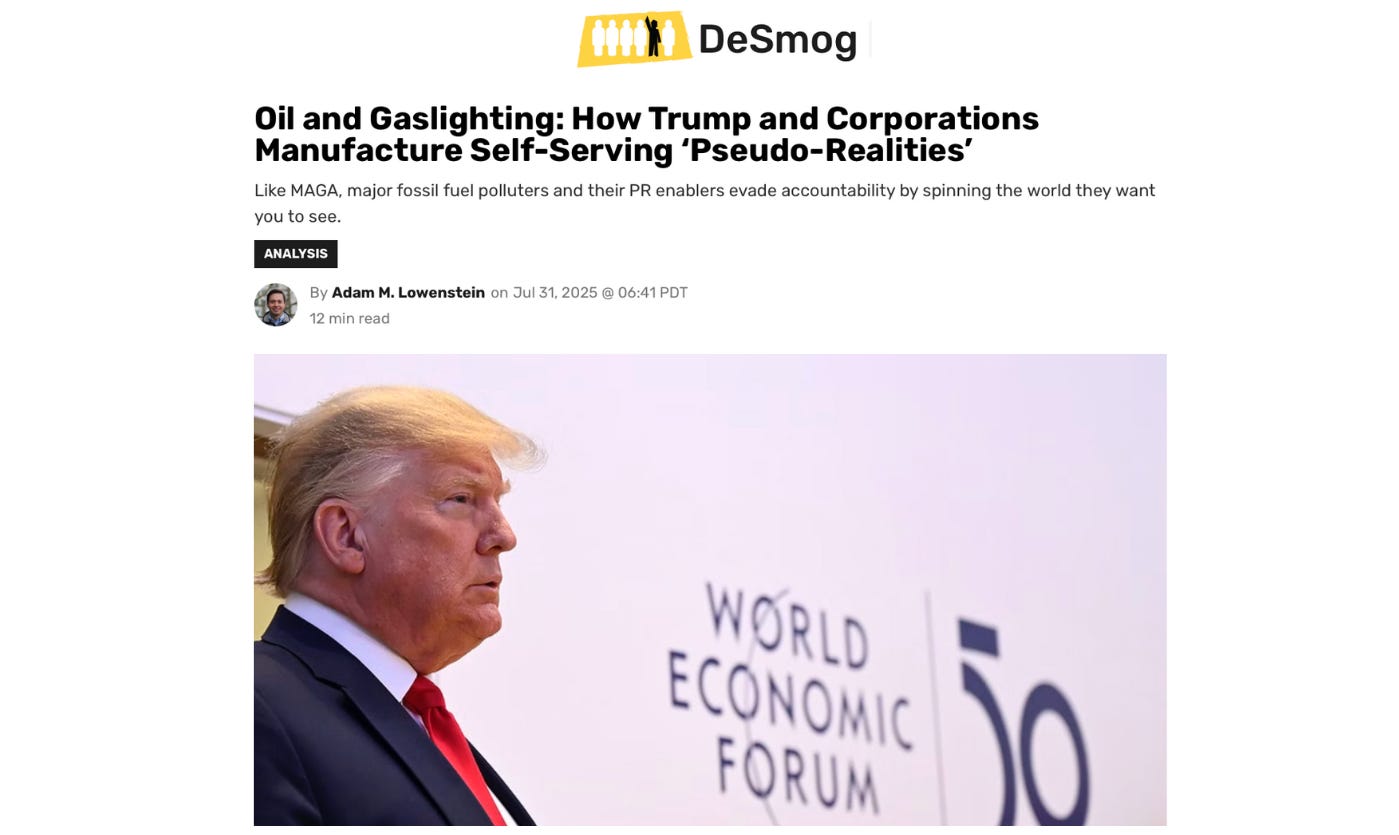The World According to the Corporation
An analysis of oil and gaslighting for DeSmog.
This morning DeSmog published my latest story: “Oil and Gaslighting: How Trump and Corporations Manufacture Self-Serving ‘Pseudo-Realities’.”
The article aims to put words around an aspect of corporate image-crafting that is hard to articulate (at least for me) but goes well beyond routine public relations and marketing: the manufacturing of alternative portrayals of how the world is.
The story introduces these “pseudo-realities” by highlighting a well-known figure who has proven depressingly successful at “spinning up and cashing in on pseudo-realities largely untethered from what he is actually doing”:
Back in April, when stock markets ricocheted after “Liberation Day,” chief executives and financial analysts were startled that Trump had followed through [on his tariff threats].
“We didn’t believe him,” a Wall Street executive told the Financial Times. “We assumed that someone in the administration that had an economic background would tell him that global tariffs were a bad idea.”1 Trump seemed surprised by the executives’ surprise: “I said this would exactly be the way it is,” he noted, correctly.2
But perhaps CEOs can be forgiven for assuming that the self-proclaimed “Tariff Man” was bluffing. Perhaps it’s understandable that some of the world’s most powerful and highly compensated executives … filed Trump’s campaign pledges—“tariffs are the greatest thing ever invented,” he declared last fall—in the category of “things politicians say.”3
After all, making high-profile promises on which they have no intention of following through—promises that are based largely on what they want people to think is true, or simply what is convenient to say in the moment—is how corporations operate every day.
Indeed, with the help of well-paid public relations firms, prestigious consultants, and elite conveners like the World Economic Forum [WEF], executives and their organizations construct what might be considered “pseudo-realities”: alternative portrayals of the world that serve a company’s interests but have little bearing on how the company actually makes money.
In the digital age, in fact, operating in the space between word and deed, between image and action, between theater and reality, has become the modus operandi of the corporate world, especially fossil fuel companies.
The WEF, the PR agency Edelman, and the president of the United States (sigh) each exemplify the strategy behind, and the power of, these pseudo-realities.
For instance, the WEF—both the global nonprofit and the annual January gathering it hosts for corporate and political elites in Davos, Switzerland—presents itself to the public via a constant flood of content: videos of panel discussions and forums on YouTube, blog posts and reports rolled out to great fanfare online, self-aggrandizing pronouncements about corporate values and how its corporate members are saving the world.
But executives and other Davos-goers routinely say that the WEF’s real value—the reason they attend every year and have their companies expense hundreds of thousands of dollars for the privilege—is not the coming together to solve the world’s problems. What draw them are the private, off-the-record conversations and negotiations and deals that happen among top-tier badge-holders.4
The reality of the WEF is what happens behind closed doors.
***
Or consider one of the organization’s recent PR campaigns. The themes of the WEF’s meetings in Davos tend to reflect the stories that it wishes to tell at the time: “Rebuilding trust” (2024), “Creating a shared future in a fractured world” (2018), “Responsive and responsible leadership” (2017).5
In the summer of 2020, the WEF began rolling out one of these efforts—this time, to portray corporate bosses and politicians as shepherding the world into the post-pandemic era.6
“The Great Reset,” as this campaign was called, succeeded in telling a compelling story—though perhaps not the intended one. The Great Reset became a staple of numerous Covid-related conspiracy theories that described it as a coordinated campaign by powerful elites to eliminate ordinary people.
Yet as the author and journalist Naomi Klein pointed out in her 2023 book Doppelganger: A Trip into the Mirror World, these theories gave the WEF far too much credit—both for its ability to pull off a conspiracy and for the seriousness of its intent. Not only was the Great Reset not a coordinated effort to use vaccines to control the skeptical masses, but the Great Reset was not anything at all, beyond a routine marketing effort.
Still, in a fundamental sense, the Great Reset achieved its goal: It successfully spun into existence an alternative reality—an illusion—that was accepted by millions of people as actual reality.
***
There’s a lot more in the story, which you can read in full here: “Oil and Gaslighting: How Trump and Corporations Manufacture Self-Serving ‘Pseudo-Realities’.”
My thanks, as always, to the great people at DeSmog for editing and publishing it.
https://www.ft.com/content/e0b28b01-3cdb-4c64-be28-93f51b4a21e6
https://finance.yahoo.com/news/wall-street-comes-to-a-painful-realization-trump-was-serious-about-steep-tariffs-all-along-080044887.html
https://www.pbs.org/newshour/economy/trump-favors-huge-new-tariffs-how-do-they-work
https://www.wsj.com/business/davos-klaus-schwab-downfall-a54b4211
https://www.weforum.org/press/2024/01/wef24-rebuilding-trust-world-economic-forum-annual-meeting-2024; https://www.weforum.org/focus/davos-2018; https://www.weforum.org/stories/2017/01/everything-you-need-to-know-about-davos-2017
https://www.weforum.org/stories/2020/06/now-is-the-time-for-a-great-reset


